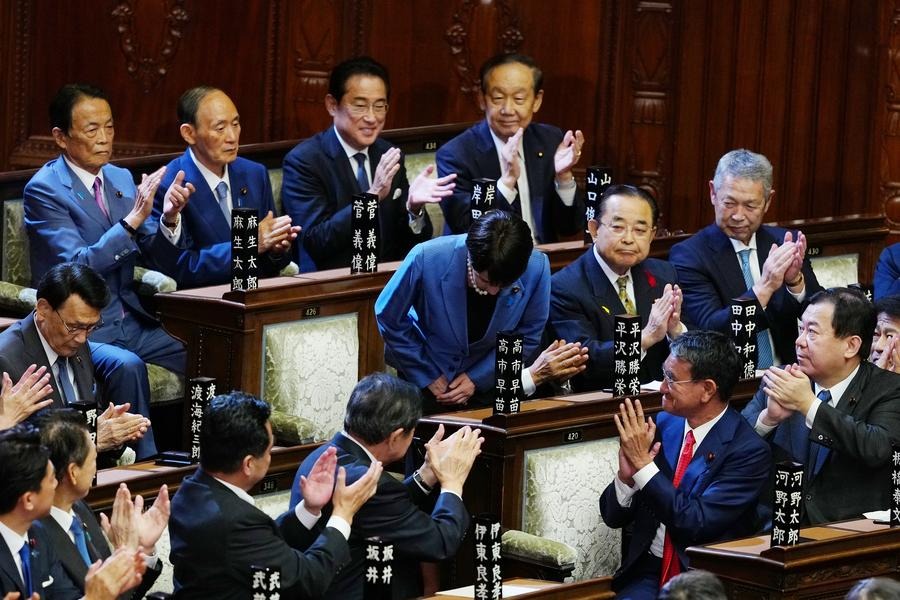Opening-up through reform
Given the global challenges, China must let its market play a more decisive role in resource allocation, remove local protectionism and promote globalization and the renminbi's internationalization


Given the global challenges, China must let its market play a more decisive role in resource allocation, remove local protectionism and promote globalization and the renminbi's internationalization
Since the United Kingdom's Brexit referendum, Donald Trump becoming US president in 2016 and the United States provoking a trade war against China in 2018, the world has entered a new round of transformation. The profound changes in the domestic and international environment have brought a series of new challenges for China's high-level opening-up. External challenges mainly include prominent anti-globalization trends, rising international geopolitical conflicts, and intensifying economic and trade frictions between China and the US. Internal ones mainly include a raft of challenges such as insufficient institutional openness and imbalanced development in the eastern, central and western regions.
In order to cope with the challenges, China has proposed to establish a new development paradigm which focuses on the domestic economy while stressing a positive interplay between domestic and international economic circulations. The Report to the 20th National Congress of the Communist Party of China proposed that "We will leverage the strengths of China's enormous market, attract global resources and production factors with our strong domestic economy, and amplify the interplay between domestic and international markets and resources". This statement signifies that China's development strategy will shift from "promoting domestic development through international means" to "promoting external development for internal growth", and from "promoting reform through opening-up" to "promoting opening-up through reform".
The following seven aspects can help China better coordinate reform and opening-up to achieve high-level opening-up.
First, the high-quality economic development has put forward higher requirements for improving the socialist market economy system, and for creating a more market-oriented, legal, and international business environment. However, there is still a gap between the transformation of government functions and the requirements of high-quality economic growth. The goal of allowing the market to play a decisive role in resource allocation has not yet been fully realized, and the marketization, rule of law, and internationalization of the business environment still need to be improved. To achieve high-level opening-up, it is necessary to further deepen the reform of institutional mechanisms, especially by aligning with international high standards to establish and improve an institutional system that truly allows the market to play a decisive role in resource allocation and the government to play a better role from the perspectives of government, enterprises, and the market.
Second, China's domestic market has a huge advantage in scale, but its expansion still faces many problems. Due to local protectionism and market segmentation, there are problems of slow flow and low allocation efficiency of various factor resources. Also, for a long time, there were no unified market system and rules in China. For these reasons, China should vigorously carry out comprehensive reform of market-oriented allocation of factors in urban agglomerations and metropolitan areas with urgent reform needs, good foundation for reform and great development potential. The pilot projects may involve elements such as land, labor, capital, technology, data, and environment. It is also necessary to establish and improve unified systems for property rights protection, market access, market supervision, fair competition, and social credit nationwide.
Third, one way to get rid of the constraints imposed by Western countries on China's scientific and technological progress is to strengthen strategic determination, adhere to the national strategic goal orientation, and clarify the main tasks and breakthroughs for core technological innovations. The other way is to give play to the market, strengthen the dominant position of enterprises in technological innovation, efficiently allocate scientific and technological forces and innovation resources, and strengthen cross-domain and interdisciplinary efforts in research.
Fourth, China should continue to play the role of a flag bearer in promoting globalization, such as actively participating in World Trade Organization reform and advancing the resumption of the WTO Appellate Body's operation. China also needs to further improve the new international multilateral cooperation mechanism led by emerging market countries. It should actively implement the Belt and Road Initiative, the Regional Comprehensive Economic Partnership Agreement, and co-build the Asian Infrastructure Investment Bank, New Development Bank, and the Silk Road Fund.
Fifth, China should steadily expand institutional opening-up in areas such as rules, regulations, management and standards. On the one hand, China should carry out the bringing-in strategy by closely tracking the evolution of high-standard international economic and trade rules, and actively align with those higher standards and higher-level rules. On the other hand, China should accelerate the pace of its standards going global, promote its own advantageous rules worldwide in areas such as high-speed rail and digital trade, and help formulate international rules. It is equally essential to deepen international cooperation on standardization, speed up the compatibility between Chinese and international standard systems, and boost the coordinated development of domestic and international standardization.
Sixth, China should optimize the layout of domestic opening-up regionally. Regional opening-up will be a strong foothold for China's high-level opening-up. First of all, the leading status of eastern coastal areas in China's opening-up layout should be further consolidated. Second, the opening-up in the central, western, and northeastern regions should be enhanced. To accelerate the pace of opening-up in these regions, the high-quality development of key border ports, border cities, and border economic cooperation zones should be further promoted and the layout of key border development and opening-up pilot zones, border economic cooperation zones, and cross-border economic cooperation zones should be optimized, so as to better play the role of internal and external connectivity of key ports and border cities. In addition, the New International Land-Sea Trade Corridor connects the Silk Road Economic Belt to the north with the 21st Century Maritime Silk Road to the south, helping upgrade infrastructure in the provincial-level regions of western China and facilitating their integration into the global cargo transportation system, thus helping them form a new pattern of opening-up.
Seventh, the Chinese government should steadily and continuously promote the internationalization of the renminbi based on its deep participation in the global industrial division of labor and cooperation, and pay more attention to quality rather than speed. To do so, efforts should be made in the following aspects: First, China needs to continue to optimize its institutional design, policy support, and market cultivation, strengthen the coordination of domestic and foreign currency policies, and encourage market entities to more conveniently use the renminbi for pricing and settlement in international trade and investment. Second, the renminbi liquidity supply mechanism should be continuously improved and innovated, and deep cooperation between the offshore and onshore markets of the renminbi should also be intensified. The third is to continuously optimize the layout of renminbi-clearing banks, deepen bilateral monetary cooperation, and better cultivate the offshore renminbi market. Finally, while promoting the internationalization of the renminbi, attention should also be paid to maintaining financial security and preventing systemic financial crises. China still needs to adhere to the principle of making gradual and controllable progress in terms of capital account opening.
Zhang Ming is the deputy director of the Institute of Finance and Banking at the Chinese Academy of Social Sciences and the deputy director of the National Institution for Finance and Development. Zhang Zhe is a PhD candidate at the School of International Politics and Economics at the University of the Chinese Academy of Social Sciences. The authors contributed this article to China Watch, a think tank powered by China Daily. The views do not necessarily reflect those of China Daily.
Contact the editor at editor@chinawatch.cn


































